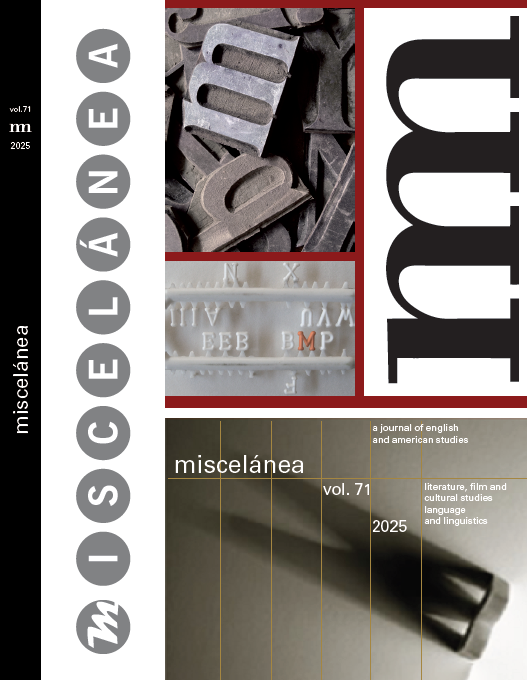English (UK) La Medarquía: Disciplina médica y el panóptico en Caduceus Wild
DOI:
https://doi.org/10.26754/ojs_misc/mj.202510413Palabras clave:
medicina, panóptico, poder, ficción especulativa, disciplinaResumen
El presente artículo explora la naturaleza paradójica del biopoder cuando los intereses sociales, políticos y económicos entran en conflicto con la individualidad y la autonomía. Se presta especial atención al concepto foucaultiano del panóptico para contemplar los mecanismos de (auto)supervisión como los instrumentos más efectivos de control social. Tomando la reciente pandemia como punto de partida para una reflexión crítica, este estudio plantea cuestiones sobre los límites y jurisdicción del biopoder mediante el análisis de la novela especulativa Caduceus Wild, publicada en 1959 por Ward Moore junto con Robert Bradford. El presente análisis se centra, en primer lugar, en el panóptico como el instrumento disciplinario más importante para atajar la crisis de salud global provocada por el coronavirus. En segundo lugar, se examinan las particularidades del género de distopía sanitaria. Finalmente, se explora el potencial de los discursos del biopoder para transformar la autoridad institucional de la medicina para actuar en nombre de la salud pública en un sistema opresivo de control social que adopta la forma de un régimen médico totalitario, como el descrito en el mundo ficticio imaginado por Moore y Bradford.
Descargas
Referencias
ATWOOD, Margaret. 1998. The Handmaid’s Tale. Anchor Books.
ATWOOD, Margaret. 2015. The Heart Goes Last. Virago.
BACCOLINI, Raffaella and Tom MOYLAN. 2003. “Dystopia and Histories”. In Dark Horizons: Science Fiction and the Dystopian Imagination. Routledge: 1-12.
BURY, Michael. 2005. “Postmodernity and Health”. In Scambler, Graham and Paul Higgs (eds.) Modernity, Medicine and Health: Medical Sociology Towards 2000. Routledge: 1-28.
CHOWKWANYUN, Merlin. 2019. “The Fall and Rise of Mid-Century Student Health Activism: Political Repression, McCarthyism, and the Association of Internes and Medical Students (1947-1953)”. Journal of the History of Medicine and Allied Sciences 74 (2): 127-144. DOI: https://doi.org/10.1093/jhmas/jrz026
CISNEY, Vernon W. and Nicolae MORAR. 2015. Biopower: Foucault and Beyond. University of Chicago Press. DOI: https://doi.org/10.7208/chicago/9780226226767.001.0001
COUCH, Danielle L., Priscilla ROBINSON and Paul A. KOMESAROFF. 2020. “COVID-19 -Extending Surveillance and the Panopticon”. Journal of Bioethical Inquiry 17 (4): 809-814. DOI: https://doi.org/10.1007/s11673-020-10036-5
CRAWFORD, Robert. 1980. “Healthism and the Medicalization of Everyday Life”. International Journal of Health Services 10 (3): 365-388. DOI: https://doi.org/10.2190/3H2H-3XJN-3KAY-G9NY
DOWNING, Raymond. 2011. Biohealth. Beyond Medicalization: Imposing Health. Pickwick.
EVANS, Robin. 1971. “Bentham’s Panopticon: An Incident in the Social History of Architecture”. Architectural Association Quarterly 3 (2): 21-37.
FALCUS, Sarah. 2020. “Age and Anachronism in Contemporary Dystopian Fiction”. In Barry, Elizabeth and Margery Vibe Skagen (eds.) Literature and Ageism. D. S Brewer: 65-85. DOI: https://doi.org/10.1017/9781787449398.004
FOUCAULT, Michel. 1978. The History of Sexuality. Volume I: An Introduction. Trans. Robert Hurley. Pantheon Books.
FOUCAULT, Michel. 1995. Discipline and Punish. The Birth of the Prison. Trans. Alan Sheridan. Vintage Books.
FOUCAULT, Michel. 2003. The Birth of the Clinic: An Archaeology of Medical Perception. Trans. Alan Sheridan. Routledge.
FRANK, Arthur W. 1991. “From Sick Role to Health Role: Deconstructing Parsons”. In Robertson, Roland and Bryan S. Turner (eds.) Talcott Parsons: Theorist of Modernity. Sage Publications: 205-216.
GERE, Cathy. 2017. Pain, Pleasure, and the Greater Good: From the Panopticon to the Skinner Box and Beyond. The University of Chicago Press. DOI: https://doi.org/10.7208/chicago/9780226501994.001.0001
HOLMQVIST, Ninni. 2008. The Unit. Trans. Marlaine Delargy. One World.
HOLST, Jens and Remco VAN DE PAS. 2023. “The Biomedical Securitization of Global Health”. Global Health 19 (15): 1-9. DOI: https://doi.org/10.1186/s12992-023-00915-y
ISHIGURO, Kazuo. 2005. Never Let Me Go. Faber.
LUPTON, Deborah. 2012. Medicine as Culture: Illness, Disease and the Body. SAGE. DOI: https://doi.org/10.4135/9781446254530
MARINKER, Marshall. 1975. “Why Make People Patients?” Journal of Medical Ethics 1 (2): 81-84. DOI: https://doi.org/10.1136/jme.1.2.81
MCALEAR, Rob. 2010. “The Value of Fear: Toward a Rhetorical Model of Dystopia”. Interdisciplinary Humanities 27 (2): 24-42.
MOORE, Ward and Robert BRADFORD. 1959a. “Caduceus Wild”. The Original Science Fiction Stories (January): 6-73.
MOORE, Ward and Robert BRADFORD. 1959b. “Caduceus Wild”. The Original Science Fiction Stories (February): 60-122.
MOORE, Ward and Robert BRADFORD. 1959c. “Caduceus Wild”. The Original Science Fiction Stories (March): 68-113.
MOORE, Ward and Robert BRADFORD. 1959d. “Caduceus Wild”. The Original Science Fiction Stories (May): 69-115.
MOORE, Ward. 1978. Caduceus Wild. Pinnacle Books.
MORDACCI, Roberto. 1998. “The Desire for Health and the Promises of Medicine”. Medicine, Health Care and Philosophy 1: 21-30. DOI: https://doi.org/10.1023/A:1009917404217
ORWELL, George. 1949. Nineteen Eighty-Four. Harcourt, Brace & World.
OSMOND, Humphry. 1980. “God and the Doctor”. The New England Journal of Medicine 10 (302): 555-558. DOI: https://doi.org/10.1056/NEJM198003063021005
ROTHMAN, Barbara Katz. 2021. The Biomedical Empire: Lessons Learned from the COVID-19 Pandemic. Standford U.P.
SMITH-PREI, Carrie. 2012. “Relevant Utopian Realism: The Critical Corporeality of Juli Zeh’s Corpus Delicti”. Seminar: A Journal of Germanic Studies 48 (1): 107-123. DOI: https://doi.org/10.1353/smr.2012.0000
SVENAEUS, Fredrik. 2000. The Hermeneutics of Medicine and the Phenomenology of Health: Steps Towards a Philosophy of Medical Practice. Kluwer.
TURNER, Bryan S. 2001. “Disability and the Sociology of the Body”. In Albrecht, Gary L., Katherine Seelman and Michael Bury (eds.) Handbook of Disability Studies. SAGE: 252-266. DOI: https://doi.org/10.4135/9781412976251.n10
VARUL, Matthias Zick. 2010. “Talcott Parsons, the Sick Role and Chronic Illness”. Body & Society 16 (2): 72-94. DOI: https://doi.org/10.1177/1357034X10364766
WELSH, Talia. 2022. Feminist Existentialism, Biopolitics, and Critical Phenomenology in a Time of Bad Health. Routledge. DOI: https://doi.org/10.4324/9781003168676
WENDELL, Susan. 1996. The Rejected Body: Feminist Philosophical Reflections on Disability. Routledge.
WILLIAMS, Simon J. 2005. “Parsons Revisited: From the Sick Role to…?” health: An Interdisciplinary Journal for the Social Study of Health, Illness and Medicine 9 (2): 123-144. DOI: https://doi.org/10.1177/1363459305050582
ZOLA, Irving Kenneth. 1976. “Medicine as an Institution of Social Control”. Ekistics 41 (24): 210-214.
ZOLA, Irving Kenneth. 1986. “Illness Behaviour - A Political Analysis”. In McHugh, Sean and T. Michael Vallis (eds.) Illness Behavior: A Multidisciplinary Model. Plenum Press: 213-218. DOI: https://doi.org/10.1007/978-1-4684-5257-0_14
Descargas
Publicado
Número
Sección
Licencia
Derechos de autor 2025 Shadia Abdel-Rahman Téllez

Esta obra está bajo una licencia internacional Creative Commons Atribución-NoComercial 4.0.
Cómo citar
Datos de los fondos
-
Ministerio de Universidades
Números de la subvención Margarita Salas para la formación de Jóvenes doctores


